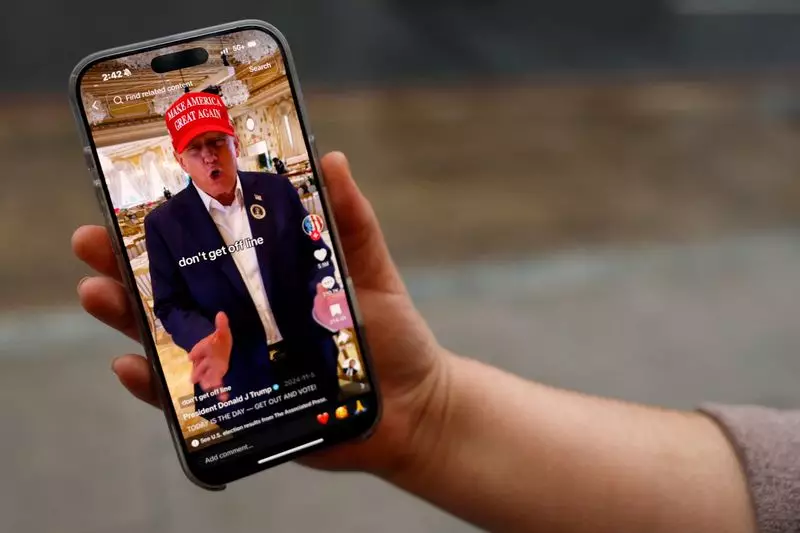The ongoing saga of TikTok continues to unfold, reflecting not only the complexities of international relations but also the growing influence of social media in our lives. As the platform finds itself under the policy microscope once again, recent developments regarding its re-entry into the U.S. market under the incoming administration of Donald Trump highlight the profound implications for users, businesses, and national security.
Following a tumultuous period where the app was rendered inaccessible to U.S. users, TikTok announced its restoration, much to the relief of millions who rely on its features for entertainment and business. The company’s statement came directly on the heels of Trump’s affirmation that he would take steps to rejuvenate the app’s presence stateside. The quick pivot from shuttering operations to a resurgence underscores not only TikTok’s significance for its users but also the political machinations that dictate its fate.
U.S. users had become accustomed to a fluctuating relationship with the app. Access issues arose right before the mandated shutdown due to national security concerns rooted in the app’s Chinese ownership under ByteDance, which has drawn the scrutiny of U.S. officials wary of data privacy vulnerabilities. By sounding optimistic notes about TikTok’s future, Trump has successfully portrayed himself as a champion for American users—particularly younger demographics who have gravitated toward the app, cementing its status as a digital quintessential for many businesses.
Trump’s recent comments that TikTok would benefit from his leadership offer insight into the intertwining relationships between technology, business, and politics. His administration previously adopted a hardline stance, questioning the safety of Americans’ data. Now, with Trump poised to extend a ‘lifeline’ to TikTok as he takes office, it begs the question: what may trigger this dramatic shift in approach?
Considering the broader economic landscape, TikTok plays a pivotal role for the over 170 million American users whose engagement has propelled small businesses to thrive in this e-commerce driven environment. Trump’s emphasis on job creation and economic growth aligns with this narrative, portraying the app less as a security threat and more as a vital component of American entrepreneurship.
Nevertheless, this seemingly strategic pivot to save TikTok occurs amid complex U.S.-China relations, where trade tensions, tariffs, and potential retaliatory actions loom large. The decision to restore TikTok’s service can be interpreted as an attempt to ease tensions with China while simultaneously maintaining domestic support, an intricate balance that reflects vast geopolitics at play.
Despite the promising announcements, challenges abound with TikTok’s ongoing operations in the U.S. Republican voices, including those from within Trump’s circle, have expressed concern regarding the legality of circumventing established regulations—underscoring the fragility of future operations. Senators like Tom Cotton and Pete Ricketts argue that the recent laws passed leave no budgetary room for extensions. Their statements reflect a broader apprehension among lawmakers concerned with national security, revealing a bipartisan divide in attitudes toward the app.
Moreover, the unprecedented move to authorize a social media platform’s ban is a historical moment for the U.S., raising complex questions about digital freedom, consumer choice, and the government’s role in regulating tech giants. These legal hurdles complicate the narrative and suggest that while TikTok might be temporarily breathing easier, the long-term prospects remain uncertain without clear resolutions regarding its ownership and the data management protocols it must follow.
As discussions continue, TikTok users find themselves in a precarious position. While the reprieve allows them to resume their routines, the uncertainty surrounding its future compels many users to consider alternative platforms. The surge in interest toward competitors such as RedNote further illustrates the fragility of TikTok’s position, with analytics showing increased user engagement on rival platforms as they seek refuge from potential disruptions.
This transitional moment signals a marked shift in how audiences interact with digital spaces, as user loyalty is tested amid concerns of an uncertain future. The rapid rise of alternative platforms resonates with younger demographics disillusioned by the volatility of the app they once embraced unconditionally.
TikTok’s journey through the tumultuous political landscape emphasizes the delicate balance between digital innovation and national security. As it stands poised to regain access, the implications resonate far beyond its simplistic premise of short videos—investors, policymakers, and users alike will continue navigating an evolving digital realm that is far from settled. In this dance of geopolitical interests and cultural phenomena, TikTok remains a decisive player, reflecting the intricate threads connecting technology, economy, and society.

